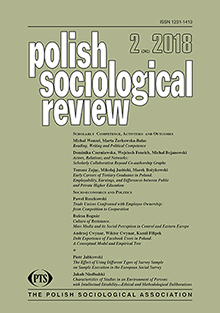The Effect of Using Different Types of Survey Sample
on Sample Execution in the European Social Survey
The Effect of Using Different Types of Survey Sample
on Sample Execution in the European Social Survey
Author(s): Piotr JabkowskiSubject(s): Sociology
Published by: Polskie Towarzystwo Socjologiczne
Keywords: types of survdey sample; fieldwork quality; comparability of cross-national surveys; European Social Survey
Summary/Abstract: Existing literature on survey methodology is not particularly saturated with studies of the relationship between the type of survey sample and the quality of their fieldwork execution. This paper focuses on three main types of probability sample, i.e., address, household and individual name sample, and examines whether limited capacity for controlling the process of within-household selection of a target respondent, that is always implemented in address and household samples, results in over-selection of easy-to-reach and cooperative respondents. Based on data from the cross-country European Social Survey project, it is demonstrated that individual name samples are associated with higher quality of fieldwork execution, while address and household samples significantly decrease fieldwork quality by over-selecting individuals more prone to staying at home and more willing to take part in a survey. It is also demonstrated that well-known survey outcome rates (such as response rate, contact rate, cooperation rate and refusal rate) are of little use in detecting fieldwork irregularities.
Journal: Polish Sociological Review
- Issue Year: 202/2018
- Issue No: 2
- Page Range: 265-278
- Page Count: 14
- Language: English

